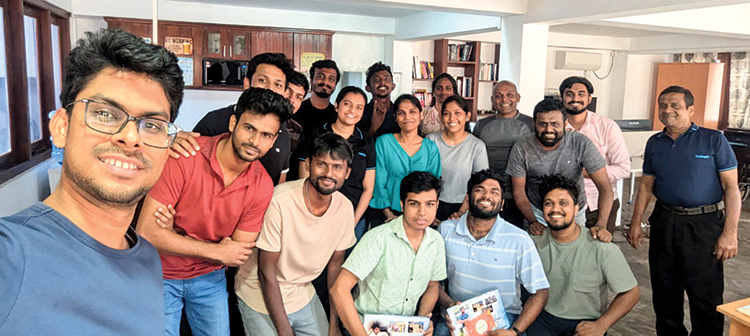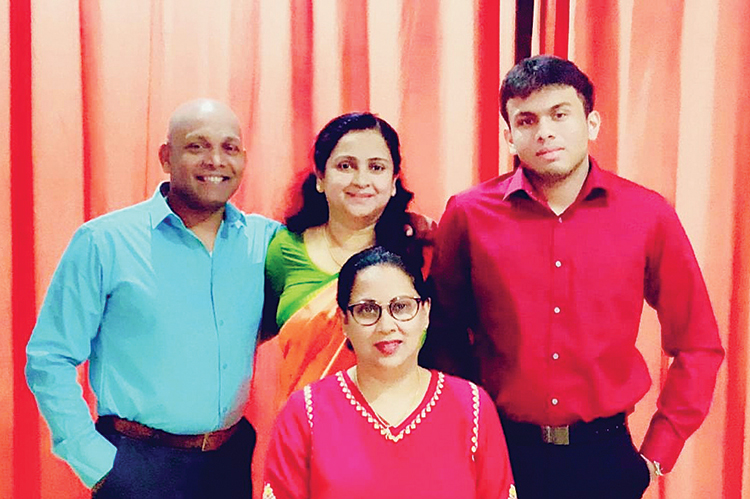Life style
From small boy to author: a Thomian’s oddysey

by Uditha Devapriya
“Farren the Wanderer”, written by Sachintha Pilapitiya and published by Neptune Publications, hit the shelves at the Book Fair on September 19
At S. Thomas’ Prep Kollupitiya, Sachintha Pilapitiya had trouble speaking in English. The problem hadn’t been his articulation or pronunciation; it had been his grammar. “Every time I opened my mouth,” he remembers, “I knew I’d trip somewhere.”
Ordinarily this would have discomfited someone, draining his or her confidence, preventing him or her from talking ever again. For Sachintha, though, the way forward seemed clear. “I resolved to speak no matter how many mistakes I made.” Having wound up as Head Prefect, he knew he had to brush up quickly. “I invariably had to speak at official functions, especially at the Assembly. So I’d go through the speeches I had written many times before I walked to the podium and delivered them.” For a while, he says, it worked.
But such a solution couldn’t last forever, and Sachintha knew that only too well. So when two of his friends – twins and batch mates – “introduced” him to the Prep School Library, he was thrilled. They would have been in Grade Three or Four then. “We discovered Enid Blyton: Famous Five, Secret Seven, and so on.”
From there they graduated to Hardy Boys, “though we didn’t move on to Nancy Drew.” When in Grade 10, he was indulging in Dan Brown, and when he offered English Literature for his O Levels, his tastes had considerably widened. By then he was poring over “serious” writers: Dickens, the Bronte sisters, and of course Shakespeare.
The Local O Level English Language paper lasts three hours, but can be completed in less than 30 minutes. At a term test Sachintha had written it in 10. That left well more than two hours to do anything he wanted in the classroom. So he reflected on the books he had read, the speeches he had made, and wrote down a story. The story was about an adventurer, an explorer, or as its author put it, a “wanderer.” It incorporated the genres he’d grown up on and grown up with, especially fantasy, sci-fi, and adventure. “I finished the basic structure in two hours. When I came back to it, I fleshed it out even more.”
That was years later. By then he had completed his A Levels, finished school, and entered university. Having added other characters and subplots, he felt ready to publish it. Through an uncle, Chamikara Pilapitiya, he met a publisher, and did just that.
Farren the Wanderer hit the Book Fair at the BMICH on September 19. While I have read the book, pored over its illustrations, and let it take back me back to a childhood spent dreaming of fantastic beasts, unrelenting explorers, charming princes, and beautiful princesses, I am less interested in its story, and how it will captivate young readers, than I am in its author, and how he grew up.
Sachintha Pilapitiya was born in Kelaniya in 2000. His father had found employment in the medical industry, while his mother worked in the IT Department at Brandix; after his sister was born two years later, she quit her job to look after them.
His parents fuelled his love for writing. From an early age his mother would tell him bedtime stories: of beasts, explorers, princes, and princesses. His father, a more practical and hands-down person, would take him and his sister out exploring, “from the north to the south and virtually everywhere in-between.” This soon brought him into contact with the immense diversity and richness of the land of his birth, a theme he has woven into all his written work thereafter. “My father put wanderlust in my blood. My mother, on the other hand, instilled a love for imagining things, for writing them down, in me.”
All that had been long, long before his education began. His first school, S. Thomas’ Prep, had contained a close-knit community, where, he remembers, differences of race and faith just melted away. “Even today, I can remember the names of almost everyone three years my junior there, and practically all the teachers and staff.”
A whole flurry of extra- and co-curricular activities, of sports and clubs, followed. In Grade Three he joined the school rugby team, and in Grade Eight he joined cadetting, two activities at which his father had excelled. While indulging in these, he straddled other pursuits as well: Cub Scouting until Grade Five, Badminton from Grade Six (winding up as the Captain), and the Interact Club from Grade Eight. Of these Cadetting had occupied him the most, and he climbed up to the post of Cadet Sergeant.
School concerts had also taken up his time. “I was always a girl: Goldilocks, Sleeping Beauty, Rapunzel, you name it,” he chortles. (I tell him that he could have fared worse; after all some of us were flowers, trees, and bushes!) “I pursued Kandyan dancing and underwent an ada ves ceremony, short of a complete ves mangalya. Given my deficiency in grammar, I began attending St Theresa’s School of Speech and Drama in Kelaniya as well.
For his O Levels, Sachintha had offered English Literature. “Not that the books we did were that interesting, though they were – R. K. Narayan’s The Vendor of Sweets, plus an anthology of poems – but I personally found the stories I discovered at the library much more fascinating.” Nevertheless he came to like his subjects, and having passed them secured a placement at S. Thomas’ College Mount Lavinia.
Sachintha entered S. Thomas’ Mount in 2017. At first, he didn’t see any difference. “It was the College version of Prep, or so I thought.” Later, however, those differences came to light, especially after his parents boarded him at the College hostel. “At Prep we had been a tight and close community: everyone knew everyone else. Here, on the other hand, it was difficult to establish contact with everyone you met.” This issue had been heightened by his parents’ decision to enrol him at the hostel, “a necessity, given that otherwise I’d have to travel to and from Kelaniya every day.”
One of the most frequent themes that run through Farren the Wanderer is the importance of understanding other communities. This came to Sachintha in his hostel years, particularly due to the people he befriended there. According to Sachintha, most of them were even less equipped with English than him. That had underlined a more glaring division: not just of language, but also of class.
“Most of those in the hostel hailed from far-off places, and nearly all of them had attended S. Thomas’ Gurutalawa or Bandarawela. They were encountering English for the first time here, in Mount. The first few days at the boarding became hard to adjust to. Once I got to befriend them well, they taught me about life. In turn I taught them English. I believe, and I hope, that I succeeded, because it was my way of repaying my debt to them.”
The crowning moment of these encounters had been an Inter-House Drama Competition in 2018. Accordingly, the boarding students who belonged to Sachintha’s House – Sachintha being the House Captain – had to jump over their linguistic handicap, since they were competing against ordinary College students “all or most of whom hailed from English speaking backgrounds and could muster only broken Sinhala.” The odds were not in their favour, clearly; everything seemed to favour their competitors.
And yet, they emerged runners-up. That had shocked everyone. For a while thereafter, the feeling persisted that, somehow, the “bounders” had triumphed.
Sachintha found the experience refreshing. “It showed not only that we could prevail, but also that we could rebel against the stereotype of us being rasthiyadukarayo, which is how many ordinary students viewed those boarded at College.” Along the way, he managed to seal his friendships with them. “Even now, I know that if I call them up, they’ll be with me and by my side. They may have been demeaned as loafers, but I know that they are much, much more sincere than those who demean them.”
I feel I’ve written too much. I’ll conclude by mentioning that Sachintha offered an unusual combination for his A Levels – Combined Maths, Literature, and Economics – and topped them so well that New York University Abu Dhabi offered him a scholarship. He plans to leave the next year, in January or February, and “to carry forward my wanderlust.” He could have added, though he didn’t, that he’ll continue to write there, as he has here: while majoring in Economics and Legal Studies, he plans to minor in Creative Writing. In those two paths, no doubt, lies the key to his future.
The writer can be reached at udakdev1@gmail.com
Life style
Salman Faiz leads with vision and legacy

Salman Faiz has turned his family legacy into a modern sensory empire. Educated in London, he returned to Sri Lanka with a global perspective and a refined vision, transforming the family legacy into a modern sensory powerhouse blending flavours,colours and fragrances to craft immersive sensory experiences from elegant fine fragrances to natural essential oils and offering brand offerings in Sri Lanka. Growing up in a world perfumed with possibility, Aromatic Laboratories (Pvt) Limited founded by his father he has immersed himself from an early age in the delicate alchemy of fragrances, flavours and essential oils.
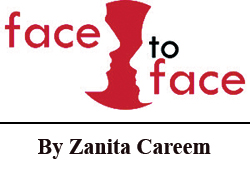 Salman Faiz did not step into Aromatic Laboratories Pvt Limited, he stepped into a world already alive with fragrance, precision and quiet ambition. Long before he became the Chairman of this large enterprise, founded by his father M. A. Faiz and uncle M.R. Mansoor his inheritance was being shaped in laboratories perfumed with possibility and in conversations that stretched from Colombo to outside the shores of Sri Lanka, where his father forged early international ties, with the world of fine fragrance.
Salman Faiz did not step into Aromatic Laboratories Pvt Limited, he stepped into a world already alive with fragrance, precision and quiet ambition. Long before he became the Chairman of this large enterprise, founded by his father M. A. Faiz and uncle M.R. Mansoor his inheritance was being shaped in laboratories perfumed with possibility and in conversations that stretched from Colombo to outside the shores of Sri Lanka, where his father forged early international ties, with the world of fine fragrance.
Growing up amidst raw materials sourced from the world’s most respected fragrance houses, Salman Faiz absorbed the discipline of formulation and the poetry of aroma almost by instinct. When Salman stepped into the role of Chairman, he expanded the company’s scope from a trusted supplier into a fully integrated sensory solution provider. The scope of operations included manufacturing of flavours, fragrances, food colours and ingredients, essential oils and bespoke formulations including cosmetic ingredients. They are also leading supplier of premium fragrances for the cosmetic,personal care and wellness sectors Soon the business boomed, and the company strengthened its international sourcing, introduced contemporary product lines and extended its footprint beyond Sri Lanka’s borders.
Today, Aromatic Laboratories stands as a rare example of a second generation. Sri Lankan enterprise that has retained its soul while embracing scale and sophistication. Under Salman Faiz’s leadership, the company continues to honour his father’s founding philosophy that every scent and flavour carries a memory, or story,and a human touch. He imbibed his father’s policy that success was measured not by profit alone but the care taken in creation, the relationships matured with suppliers and the trust earned by clients.
“We are one of the leading companies manufacturing fragrances, dealing with imports,exports in Sri Lanka. We customise fragrances to suit specific applications. We also source our raw materials from leading French company Roberte’t in Grasse
Following his father, for Salman even in moments of challenge, he insisted on grace over haste, quality over conveniences and long term vision over immediate reward under Salman Faiz’s stewardship the business has evolved from a trusted family enterprise into a modern sensory powerhouse.
Now the company exports globally to France, Germany, the UK, the UAE, the Maldives and collaborates with several international perfumes and introduces contemporary products that reflect both sophistication and tradition.
We are one of the leading companies. We are one of the leading companies manufacturing fine and industrial fragrance in Sri Lanka. We customise fragrances to suit specific applications said Faiz
‘We also source our raw materials from renowned companies, in Germany, France, Dubai,Germany and many others.Our connection with Robertet, a leading French parfume House in Grasse, France runs deep, my father has been working closely with the iconic French company for years, laying the foundation for the partnership, We continue even today says Faiz”
Today this business stands as a rare example of second generation Sri Lankan entrepreneurship that retains its souls while embracing scale and modernity. Every aroma, every colour and every flavour is imbued with the care, discipline, and vision passed down from father to son – a living legacy perfected under Salmon Faiz’s guidance.
By Zanita Careem
Life style
Home coming with a vision
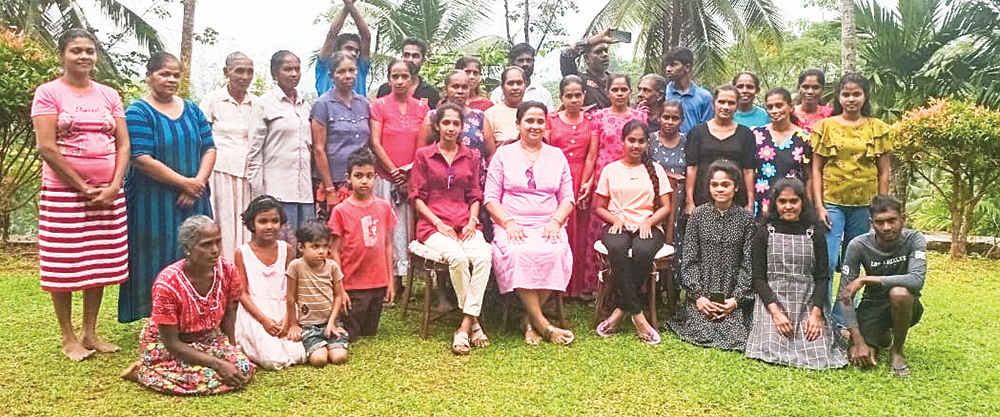
Harini and Chanaka cultivating change
When Harini and Chanaka Mallikarachchi returned to Sri Lanka after more than ten years in the United States, it wasn’t nostalgia alone that they brought home . It was purpose.Beneath the polished resumes and strong computer science backgrounds lay something far more personal- longing to reconnect with the land, and to give back to the country that shaped their memories. From that quiet but powerful decision was born Agri Vision not just an agricultural venture but a community driven movement grounded in sustainability ,empowerment and heritage. They transform agriculture through a software product developed by Avya Technologies (Pvt Limited) Combining global expertise with a deep love for their homeland, they created a pioneering platform that empowers local farmers and introduce innovative, sustainable solutions to the country’s agri sector.
After living for many years building lives and careers in theUnited States, Harini and Chanaka felt a powerful pull back to their roots. With impressive careers in the computer and IT sector, gaining global experience and expertise yet, despite their success abroad, their hearts remained tied to Sri Lanka – connection that inspired their return where they now channel their technological know-how to advance local agriculture.
For Harini and Chanaka, the visionaries behind Agri Vision are redefining sustainable agriculture in Sri Lanka. With a passion for innovation and community impact, they have built Agri Vision into a hub for advanced agri solutions, blending global expertise with local insight.
In Sri Lanka’s evolving agricultural landscape, where sustainability and authenticity are no longer optional but essential. Harini and Chanaka are shaping a vision that is both rooted and forward looking. In the heart of Lanka’s countryside, Uruwela estate Harini and Chanaka alongside the ever inspiring sister Malathi, the trio drives Agri Vision an initiative that fuses cutting edge technology with age old agricultural wisdom. At the core of their agri philosophy lies two carefully nurtured brands artisan tea and pure cinnamon, each reflecting a commitment to quality, heritage and people.
Armed with global exposure and professional backgrounds in the technology sector,they chose to channel thier experiences into agriculture, believing that true progress begins at home.
- Avya Technologies (Pvt) ltd software company that developed Agri Vision
- Chanaka,Harini and Shakya Mallikarachchi and Malathi Malathi dias (middle)
But the story of Agri Vision is as much about relationships as it is about technology. Harini with her sharp analytical mind, ensures the operations runs seamlessly Chanaka, the strategist looks outward, connecting Agri Vision to globally best practices and Malathi is their wind behind the wings, ensures every project maintains a personal community focussed ethos. They cultivate hope, opportunity and a blueprint for a future where agriculture serves both the land and the people who depend on it .
For the trio, agriculture is not merely about cultivation, it is about connection. It is about understanding the rhythm of the land, respecting generations of farming knowledge, and that growth is shared by the communities that sustain it. This belief forms the backbone of Agro’s vision, one that places communities not only on the periphery, but at the very heart of every endeavour.
Artisan tea is a celebration of craft and origin sourced from selected growing regions and produced with meticulous attention to detail, the tea embodier purity, traceability and refinement, each leaf is carefully handled to preserve character and flavour, reflecting Sri Lanka’s enduring legacy as a world class tea origin while appealing to a new generation of conscious consumers complementing this is pure Cinnamon, a tribute to authentic Ceylon, Cinnamon. In a market saturated with substitutes, Agri vision’s commitment to genuine sourcing and ethical processing stands firm.
By working closely with cinnamon growers and adhering to traditional harvesting methods, the brands safeguards both quality and cultural heritage.
What truly distinguishes Harini and Chanake’s Agri Vision is their community approach. By building long term partnerships with smallholders. Farmers, the company ensures fair practises, skill development and sustainable livelihoods, These relationships foster trust and resilience, creating an ecosystem where farmers are valued stakeholders in the journey, not just suppliers.
Agri vision integrates sustainable practices and global quality standards without compromising authenticity. This harmony allows Artisan Tea and Pure Cinnamon to resonate beyond borders, carrying with them stories of land, people and purpose.
As the brands continue to grow Harini and Chanaka remain anchored in their founding belief that success of agriculture is by the strength of the communities nurtured along the way. In every leaf of tea and every quill of cinnamon lies a simple yet powerful vision – Agriculture with communities at heart.
By Zanita Careem
Life style
Marriot new GM Suranga
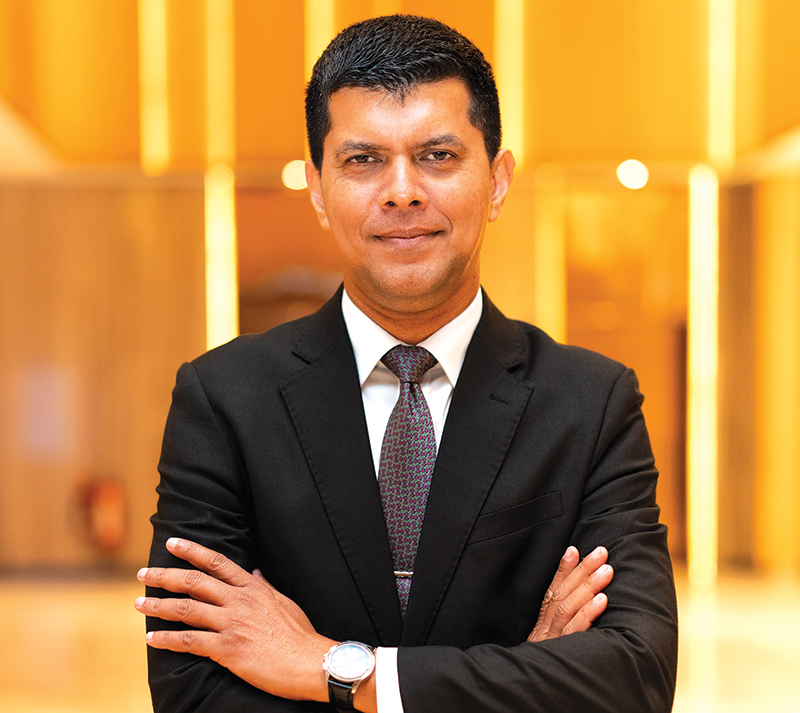
Courtyard by Marriott Colombo has welcomed Suranga Peelikumbura as its new General Manager, ushering in a chapter defined by vision, warmth, and global sophistication.
Suranga’s story is one of both breadth and depth. Over two decades, he has carried the Marriott spirit across continents, from the shimmering luxury of The Ritz-Carlton in Doha to the refined hospitality of Ireland, and most recently to the helm of Resplendent Ceylon as Vice President of Operations. His journey reflects not only international mastery but also a devotion to Sri Lanka’s own hospitality narrative.
What distinguishes Suranga is not simply his credentials but the philosophy that guides him. “Relationships come first, whether with our associates, guests, partners, or vendors. Business may follow, but it is the strength of these connections that defines us.” It is this belief, rooted in both global perspective and local heart, that now shapes his leadership at Courtyard Colombo.
At a recent gathering of corporate leaders, travel partners, and media friends, Suranga paid tribute to outgoing General Manager Elton Hurtis, hon oring his vision and the opportunities he created for associates to flourish across the Marriott world. With deep respect for that legacy, Suranga now steps forward to elevate guest experiences, strengthen community ties, and continue the tradition of excellence that defines Courtyard Colombo.
From his beginnings at The Lanka Oberoi and Cinnamon Grand Colombo to his leadership roles at Weligama Bay Marriott and Resplendent Ceylon, Suranga’s career is a testament to both resilience and refinement. His return to Marriott is not merely a professional milestone, it is a homecoming.
-

 Life style2 days ago
Life style2 days agoMarriot new GM Suranga
-

 Business24 hours ago
Business24 hours agoMinistry of Brands to launch Sri Lanka’s first off-price retail destination
-

 Features2 days ago
Features2 days agoMonks’ march, in America and Sri Lanka
-

 Midweek Review6 days ago
Midweek Review6 days agoA question of national pride
-

 Business6 days ago
Business6 days agoAutodoc 360 relocates to reinforce commitment to premium auto care
-

 Opinion5 days ago
Opinion5 days agoWill computers ever be intelligent?
-

 Features2 days ago
Features2 days agoThe Rise of Takaichi
-

 Features2 days ago
Features2 days agoWetlands of Sri Lanka:




